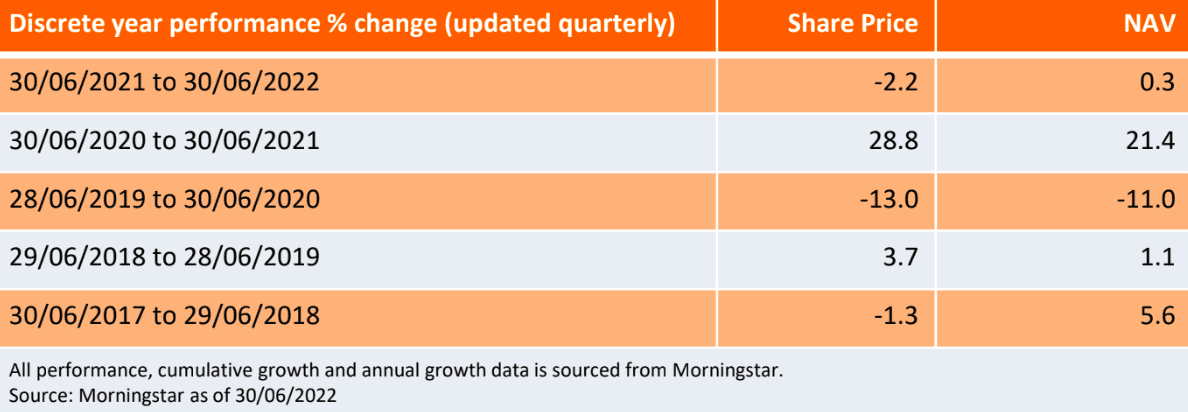
David Smith, Portfolio Manager of Henderson High Income Trust, provides an update on the Trust highlighting the key drivers of performance over the month of June and outlines recent portfolio activity.
Macro backdrop
The FTSE All Share Index declined by 6.0% during the month as fears over high inflation and slowing economic growth weighed on sentiment.¹ The Bank of England (BoE) raised interest rates by 25 basis points (bps) to 1.25% – the fifth increase in as many meetings. UK monthly gross domestic product (GDP) growth unexpectedly shrank by 0.3% in April, consumer confidence dropped to a record low in June, while the annual inflation rate edged up to 9.1% in May – a 40-year high – from 9.0% in April.² The jobs market remained strong, however, with the number of people in full-time employment and job vacancies both at all-time highs. Sterling weakened against the US dollar – hitting a two-year low around mid-June – weighed down by the largely downbeat economic news, trade tensions with the European Union, and the prospect of another independence referendum in Scotland.
Trust performance and activity
The Trust’s net asset value (with debt at fair value) fell -6.8% during June, underperforming the benchmark’s decline of 5.4%.¹ Given the weak market backdrop, the main detractor from returns was the negative impact from gearing within the Trust.
Within the equity portfolio, the overweight positions in tobacco companies, British American Tobacco (BAT) and Imperial Brands, plus RELX and Tesco were positive for performance as investors sought out their defensive characteristics given recessionary fears. BAT also announced a reassuring trading statement in the period with a clearer path towards profitable growth from its Next Generation Products.
Elsewhere, the overweight positions in Anglo American and National Express detracted from returns. Commodity prices were weak during the month, given the concerns over slowing global economic growth, which weighed on Anglo American’s share price. National Express warned that driver shortages in its US school bus division would hold back margin recovery this year.
During the month, we initiated a new position in the UK listing of Australia’s largest oil and gas company, Woodside Energy. Following the company’s merger with BHP’s oil and gas assets, we think the business is well positioned in low-cost, long-life liquefied natural gas (LNG) assets in Australia and high margin oil production in the US Gulf of Mexico. We also sold the holding in TI Fluid Systems. The company supplies parts to the automobile market, hence the position was sold due to concerns over the potential impact on profits from a slowing global economy and fears over the long-term sustainability of its fuel tanks division given the long-term transition to electric vehicles.

¹Source: Bloomberg as at 30 June 2022.
Defensive stock -A defensive stock is a stock that provides consistent dividends and stable earnings regardless of the state of the overall stock market. There is a constant demand for their products, so defensive stocks tend to be more stable during the various phases of the business cycle.
Gearing – Gearing is the measure of a companies debt level. It is also the relationship between a companies leverage, showing how far its operations are funded by lenders versus shareholders. Within investment trusts it refers to how much money the trust borrows for investment purposes.
Gross Domestic Product (GDP) -The value of all finished goods and services produced by a country, within a specific time period (usually quarterly or annually). It is usually expressed as a percentage comparison to a previous time period, and is a broad measure of a country’s overall economic activity.
Inflation – The rate at which the prices of goods and services are rising in an economy. The CPI and RPI are two common measures.
Recession – A recession is a macroeconomic term that refers to a significant decline in general economic activity in a designated region.It had been typically recognised as two consecutive quarters of economic decline, as reflected by GDP in conjunction with monthly indicators such as a rise in unemployment.
![]()